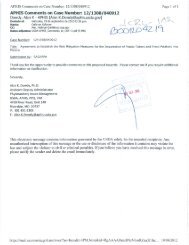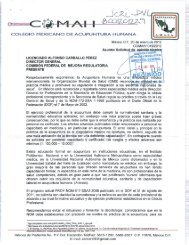Untitled
Untitled
Untitled
You also want an ePaper? Increase the reach of your titles
YUMPU automatically turns print PDFs into web optimized ePapers that Google loves.
S94<br />
the educational program may have contributed to this<br />
greater weight loss.<br />
Intervention studies of high-fiber foods not primarily aimed at<br />
weight loss<br />
In the Women’s Health Initiative, a modest self-reported<br />
increase in fruit, vegetable and fiber intake was observed in<br />
the intervention group and this was not associated with a<br />
substantial long-term effect on body weight (Howard et al.,<br />
2006). Other trials that were not aimed at weight loss<br />
generally did not find an effect of increased consumption of<br />
fruits and vegetables on body weight (Rolls et al., 2004). For<br />
example, in a 1-year trial in 201 men and women specifically<br />
aimed at fruit and vegetable consumption, fruit (diet records<br />
þ 2.8 serving per day), vegetable ( þ 1.4 serving per day),<br />
juice ( þ 2.5 serving per day) and fiber intake ( þ 5.5 g per<br />
day) increased substantially more in the intervention as<br />
compared with the control group (Smith-Warner et al.,<br />
2000). These changes were supported by increased plasma<br />
carotenoid concentrations, but no appreciable difference in<br />
weight change was found between the intervention<br />
( þ 0.3 kg) and control group ( þ 0.4 kg). It has been suggested<br />
that concomitant increases in juice consumption, a highcaloric<br />
beverage, may have reduced possible beneficial effects<br />
of the fruits and vegetable interventions on body weight<br />
(Rolls et al., 2004). An alternative explanation that is<br />
consistent with the results from prospective cohort studies<br />
is that effects of higher consumption of fiber-rich foods on<br />
body weight are modest and only apparent after several<br />
years.<br />
Cohort studies of high-fiber foods and long-term weight change<br />
The association between fiber intake and weight change has<br />
been examined in several large prospective cohort studies<br />
with detailed adjustment for potential confounders. In a<br />
study of men, a 10 g per day increase in fiber intake was<br />
associated with a 2.25 kg lower weight gain over 8 years after<br />
correction for measurement error in the assessment of fiber<br />
intake (Koh-Banerjee et al., 2004). Similar results have been<br />
obtained in women, younger adults, and a Mediterranean<br />
population (Ludwig et al., 1999; Liu et al., 2003; Bes-Rastrollo<br />
et al., 2006a). Higher consumption of whole grains (Liu et al.,<br />
2003; Koh-Banerjee et al., 2004) and fruits and vegetables (He<br />
et al., 2004; Bes-Rastrollo et al., 2006a) was also associated<br />
with a modestly lower long-term weight gain. These findings<br />
may reflect a dietary pattern rather than fiber intake per se,<br />
and the possibility that confounding by unmeasured or<br />
imprecisely measured factors contributed to these associations<br />
cannot be excluded.<br />
Conclusion on dietary fiber<br />
The currently available evidence does not support a major<br />
effect of fiber intake on weight loss, but evidence is<br />
European Journal of Clinical Nutrition<br />
Carbohydrate intake and obesity<br />
RM van Dam and JC Seidell<br />
consistent with modest long-term effects of higher consumption<br />
of fiber-rich foods on body weight gain. An<br />
important reason to attempt weight loss is the prevention<br />
of morbidity associated with excess adiposity including type<br />
2 diabetes, coronary heart disease and stroke (Willett et al.,<br />
1999). Consumption of a diet high in fruits, vegetables and<br />
whole grains is associated with reduced risk of these diseases<br />
(Appel et al., 1997; de Lorgeril et al., 1999; Jacobs and<br />
Gallaher, 2004) and should therefore be included in diets for<br />
long-term weight management. Ad libitum intervention<br />
studies that specifically examine the effects of whole grain<br />
consumption on body weight appear to be lacking and this<br />
topic warrants further research.<br />
General discussion<br />
Although weight gain is due to an imbalance between energy<br />
intake and energy expenditure, this equation is deceivingly<br />
simple in the context of obesity prevention and treatment<br />
under realistic conditions. Complex feedback mechanisms<br />
appear to stimulate regaining lost weight (Hirsch et al., 1998)<br />
and potent environmental influences stimulate over-consumption<br />
of ubiquitously available foods and a sedentary<br />
lifestyle (Egger and Swinburn, 1997). The optimal macronutrient<br />
composition of diet for weight management may<br />
also differ by individual characteristics. First, the response to<br />
diets may differ by genetic susceptibility of individuals<br />
(Memisoglu et al., 2003), although a recent study of 26<br />
candidate genes did not identify important modifiers of the<br />
effects of a high or low carbohydrate weight loss diet<br />
(Sorensen et al., 2006). Second, findings from two recent<br />
randomized intervention studies suggest that insulin sensitivity<br />
or glucose-induced insulin secretion can modify the<br />
weight loss in response to low-carbohydrate or low-GL diets<br />
(Cornier et al., 2005; Pittas et al., 2005). Larger studies are<br />
needed to test the hypothesis that characteristics related to a<br />
person’s glucose homeostasis may affect the optimal macronutrient<br />
composition for weight management. Finally, the<br />
carbohydrate content of a diet that allows long-term<br />
adherence may to a large extent depend on individual<br />
preferences. For prevention of weight gain, individuals<br />
should be able to maintain a dietary pattern that prevents<br />
excess energy intake for decades and the degree of adherence<br />
to weight loss interventions is a strong predictor of weight<br />
loss (Heshka et al., 2003; Dansinger et al., 2005).<br />
This overview is limited to dietary carbohydrates in<br />
relation to obesity. However, many other factors should be<br />
considered in the design of weight loss interventions. Selfmonitoring<br />
of diet and activity, structural approaches<br />
providing foods, meal replacements or menus and recipes,<br />
increased physical activity, and longer length of treatment<br />
have been shown to contribute to greater weight loss (Perri<br />
et al., 1989; Foster et al., 2005). Although, the achieved<br />
weight loss of long-term interventions may appear small,<br />
B5% loss of body weight as a result of dietary changes and
















